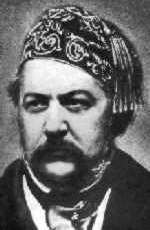|
MAD ABOUT GLINKA

Russian conductor Valery Gergiev arrives in London later this month to conduct a rare concert performance of 'A Life for the Tsar'. Musicologist Gerard McBurney talks to RODERIC DUNNETT about its importance
If anyone earned the laurels for setting Russian opera on its future course, it was
Mikhail Ivanovich Glinka. It was Glinka's groundbreaking largescale opera Ivan Susanin,
rechristened A Life for the Tsar for its première in late 1836, that
singlehandedly persuaded a reluctant Russian capital to take Russian opera seriously.
Glinka opened the doors onto a new sensibility : in a very real sense, he was Russian
music's future. He stands on a par not just with Chopin, Smetana and Liszt, but with
nineteenth century nationalist writers like Pushkin, Chekhov, Petöfi, Mickiewicz and
Victor Hugo.
'Everything in the Russian School', said Tchaikovsky, 'was foreshadowed by Glinka' -- by
which he meant Balakirev, Borodin, himself, Taneyev, Rimsky-Korsakov and even (we might add)
Prokofiev and fledgling Stravinsky. A leading Russian source, Count Odoyevsky, opined that
Glinka had proved that 'Russian melody ... may be raised to the level of tragedy.'

Mikhail Glinka
|
Not all agreed. 'The coachman in the street sings that kind of stuff', carped some
observers (forgetting, perhaps, the smash-hit popularity of Mozart, whistled in the
Vienna streets). 'You don't go to the theatre to fall on your knees,' complained a rival,
the popular Moscow-focused composer Alexey Verstovsky. He had a point. Ivan Susanin,
embracing a highly patriotic theme, is not without sentimentality; and Glinka unashamedly
embraced the Romanov revival, securing a royal pat on the back (as well as a change in
the title). Ironically, it was under the 'Russifying' Nicholas I (1825-55 : the end
of his reign embraced the Crimean War) that the benefits paid to Susanin's
successors dried up.
The thrust of Russian opera up until then had been rather different. As with Vienna, so in
St Petersburg it was the Italians who dominated eighteenth century opera. Beginning almost
exactly a century before Ivan Susanin, under the empresses Anne, Elizabeth and
Catherine the Great, from 1735 onwards, a train of Italian composers made their way to
the Imperial court. Most significant were Paisiello -- whose Barber of Seville had
its première there -- and Cimarosa (as well as the Italicised, and then Vienna-based,
Spaniard Vicente Martin y Soler), who added lustre to the capital city over a quarter of a
century, between 1776 and 1804.
Some operas were sung in Russian (Soler became recognised as a noted setter of the
language); Bortnyansky wrote comic operas; and Catherine herself wrote libretti that
initiated the Russian fairy tale genre, later taken up by Glinka, Rimsky and Prokofiev.
The Singspiel ruled (even a setting in 1815 of the Ivan Susanin story by the
Russified Venetian composer Catterino Cavos), and there was a tradition of Vaudeville
theatre, which made ample use of popular Slavonic dances such as the mazurka and polonaise --
idioms which Glinka himself was not averse to embracing, not without irony, in the
'Polish' scenes in Act II of his opera. But with the 1830s Rossini resurgence (especially
Semiramide, staged in the very year of Ivan Susanin, and starring the same lead
singers), Russian opera again took a back seat, even after Glinka's
masterpiece had triumphed.
Continue >>
Copyright © 11 May 2003
Roderic Dunnett, Coventry, UK

|

